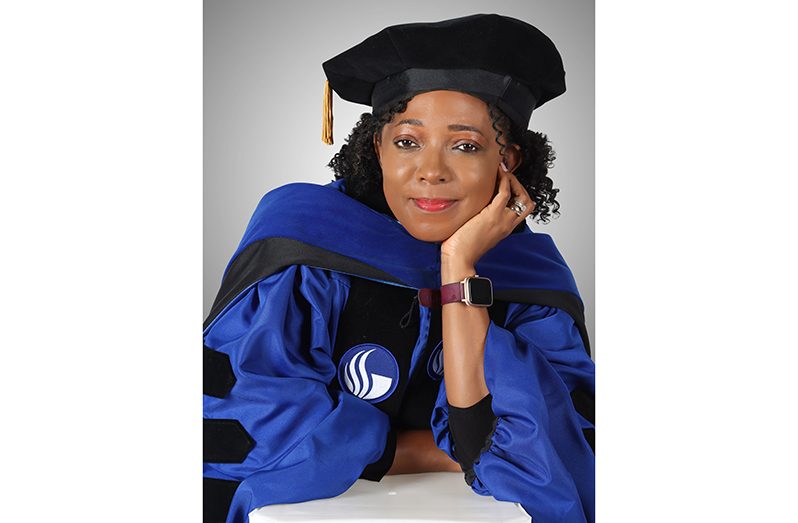THE University of Guyana Centre for Communications Studies (UGCCS) will be graduating the first batch of students who completed the Master’s Degree in Communications Studies for the year 2023.
Dr. Carolyn Walcott, the programme’s coordinator, spoke with the Daily Chronicle and shared that they will be graduating their first cohort of seven students this year. Additionally, she mentioned that they are receiving applications for the second cohort, and aspire to draw in a larger number of students.
Dr. Walcott stated that the Master of Social Science in Communications Studies was conceptualised around 2007 as part of a grand project called Phoenix. This project sought to rebuild the physical and human infrastructure of the UGCCS.
“At that time, the UGCCS was led by Professor Paloma Mohamed-Martin, UG’s current Vice-Chancellor, who, along with the small team of faculty, envisioned and developed a revitalised curriculum, with critical support from international and local stakeholders.” Dr. Walcott said, adding:
“Sustainable development and the establishment of key linkages between stakeholders (both internal and external), to foster knowledge sharing and capacity building also reside at the heart of the programme.”
The master’s programme was earmarked as part of the strategic offerings of the UGCCS to provide undergraduates with advanced theoretical and practical training for careers in media and communications.
In two years (four semesters), students are taught both core courses, and those under their specialisation. It was stated that students have an option of completing the requirements within two years, or they can opt to develop a four-to-five-year plan of completion. Dr. Walcott cautions, however, that while they encourage diligence in exercising the available options, they also recognise the need for flexibility, given the pressures of a work-school-life balance that many often juggle.
The first three semesters comprise 11 taught core courses. These are inclusive of one elective and one internship, in addition to four taught courses per specialisation. Among the courses being taught are: Persuasion and Ethics; Social Change Communication; Research Methods; Project Management; Crisis Communication; Social Media Use and Abuse; Communicating Public Policy; and Data Visualisation. During the final semester, students will undertake either an individual practical project, or a research-based thesis applicable to the selected specialisation. Students, in addition to this, are offered three major areas of specialization, these being: Strategic Communication; Social Change Communication; and Visual Communication.
Compatible with these areas are the overall aims of capacity building for corporate employees, in both the public and private sectors, as social change agents, or those who wish to shape the world through imagery.
The Master’s Programme is built with the aim which includes providing both culturally sensitive, innovative, and specialized curricula which address the knowledge gaps associated with locally and regionally produced programmes and projects; this includes research, in Strategic Communication, Social Change Communication, and Visual Communication.
Moreover, the programme also seeks to provide students with a strong foundation to follow their academic goals beyond a master’s degree level; all while nurturing the ethical creation, implementation, and evaluation of programs and projects that will contribute to local and global solutions.
ENTRY REQUIREMENTS
Those candidates who meet any of the following requirements are welcome to apply to the programme. These requirements include A Degree in Communications Studies from the University of Guyana, or its equivalent from a recognised institution with at least a 2.7 GPA on a 4.0 scale (credit); a bachelor’s degree, deemed as suitable with at least a 2.7 GPA on a 4.0 scale (credit); mature applicants (26 years and over) with a Degree in Communication, or related discipline.
Transfer students will be evaluated under the University’s regulations, and be awarded exemptions, where applicable, on acceptance into the programme. However, the minimum requirements for entry must be met; any other qualification considered by the University to be equivalent to any of the above, or acceptable.
Based on the above, applicants who wish to change careers and may not have a media background are also welcome to engage in the programme of study.
WHY OUR PROGRAMME?
Dr. Walcott said, “While we recognize that our students have options, the master’s programme offers students a space to learn and create at the same time. We also have a pool of dedicated and highly qualified instructors drawn from Guyana and abroad, who teach live online rather than asynchronous. Apart from their academic credentials, the lecturers on the programme have significant expertise in their respective fields which augers well for knowledge transfer in an evolving media and communication discipline.”
She noted that in a post-Covid era of online education, many tertiary institutions abroad offer online options for graduate students who must adapt and function independently in some instances. However, in Guyana, the live classes are created to facilitate engaged learning and application for students who are also exposed to real case studies. Furthermore, students engage in group discourses and projects that help to build their skillset individually and collectively as communication and social change strategists.




.jpg)










